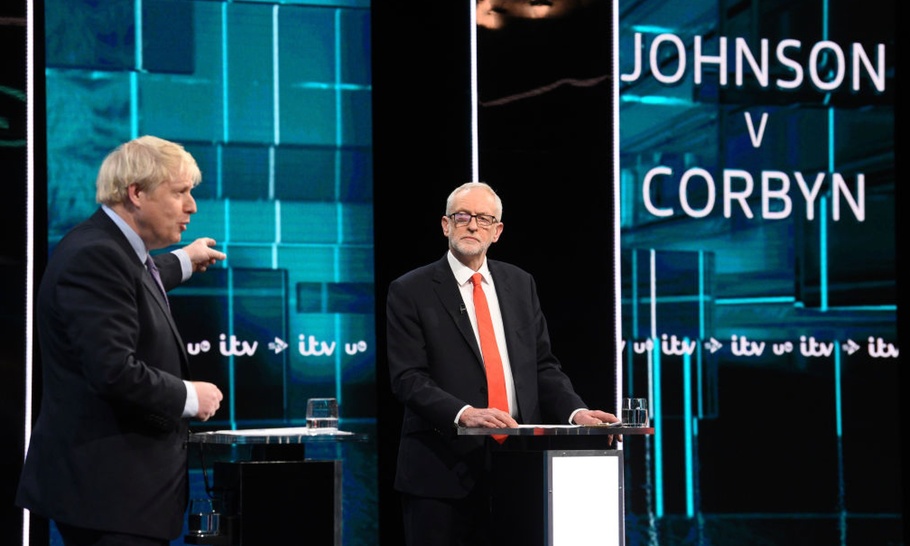First blood in the television duel went to Boris, but Corbyn is far from finished

ITV Leaders Debate, 2019 (Photo by Jonathan Hordle/ITV via Getty Images)
So now we know. In trade talks with America, Boris Johnson would never “put the NHS on the table”. As for anti-Semitism: Jeremy Corbyn says: “We do take this very seriously indeed.” Their very first debate on ITV has at least pinned down both main party leaders on their most vulnerable points.
Actually, only one of these pledges has any plausibility. Corbyn brandished what he claimed was a heavily redacted official document, purportedly proving Johnson’s eagerness to “sell out the NHS to the US and Big Pharma”. But the Tories have never done such a thing before and there is no reason to think that they intend to do so now. Although some in the audience laughed at the Prime Minister’s protestation of personal integrity, his incensed denial of a plot to auction off the NHS had the ring of truth.
By contrast, Corbyn’s indignant invocation of “the Jewish people”, when charged with having allowed Labour to become institutionally anti-Semitic, sounded both confected and insincere. Indeed, his increasingly hysterical reaction to such accusations smacks of desperation. We got a glimpse of what he has to hide when he was asked about Prince Andrew. Corbyn pronounced Jeffrey Epstein’s name as “Epshtein”, as if to emphasise the disgraced American businessman’s Jewish origin. To non-Jews, such details are insignificant. To Jews, they are telltale signs of the Leftist anti-Semitic mindset for which the evidence is now overwhelming. The Labour leader will carry this albatross until polling day and beyond. The only question is: how much does the Great British public care?
But the real story of this first televised duel of the campaign was that this is still the Brexit election. Try as Corbyn might to avoid it, he could not evade the nagging question: whose side is he on? Quite apart from the implausibility of his boast that he could negotiate a better withdrawal deal with the EU in three months, his refusal to say whether he would then support or oppose it in a referendum was simply embarrassing. Sensing that this was the weakest of his opponent’s many weak spots, Johnson relentlessly turned every question he was asked back to this issue. By the end of the debate, Corbyn had avoided it at least eight times.
His evasiveness was not lost on viewers at home, although the live audience in Salford seemed sympathetic to Labour. Snap polls awarded Boris Johnson victory, albeit a narrow one. The main thing, though, was that the Prime Minister emerged unscathed.
The Tory lead has begun to slip: YouGov has it down by five points, from 17 to 12, in a week. That such a narrowing of the polls was predictable and predicted does not make it any less worrying for the Conservatives. They still have three weeks to go. While their manifesto won’t be published until next week, it could yet expose vulnerabilities.
Last night Boris Johnson mentioned that the manifesto would include a new social care policy guaranteeing that nobody would have to sell their home to pay for residential care. He was not interrogated about this promise, but voters will want to know how it will be paid for.
The Prime Minister also sounded unconvincing when asked by a doctor about how he would address the crisis in the NHS, apart from throwing money at it. While Johnson floundered when scrutinised on his hospital-building programme, Corbyn was able to talk about the case of a woman he knew, dying of breast cancer, who had been kept waiting for eight hours in a hospital that “looked like Beirut”. The Labour leader’s ability to cite such personal testimony explains why the polls show that the public think he is more “in touch” than the PM.
This debate was an opening skirmish rather than a decisive battle. Corbyn can ill afford to lose opportunities to bring down his foeman, but the latter must at all costs avoid taking the public for granted. Bumptious Boris is not a good look and there were moments when he lapsed into a bombastic style of rhetoric that works in the Commons but could be fatal on television.
In his account of the Great War, The World Crisis, Winston Churchill wrote of the commander of the Grand Fleet, Admiral Jellicoe, that he was “the only man on either side who could lose the war in an afternoon”. In this election campaign, Boris Johnson is that man — and he knows it.





